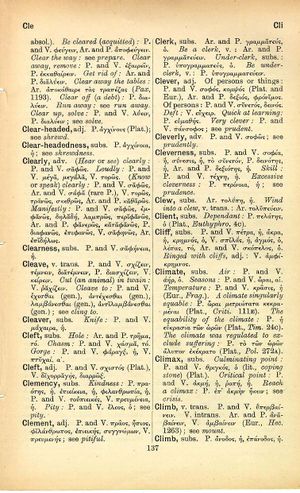clew: Difference between revisions
From LSJ
Περὶ τοῦ ἐπέκεινα τοῦ νοῦ κατὰ μὲν νόησιν πολλὰ λέγεται, θεωρεῖται δὲ ἀνοησίᾳ κρείττονι νοήσεως → On the subject of that which is beyond intellect, many statements are made on the basis of intellection, but it may be immediately cognised only by means of a non-intellection superior to intellection
(CSV3) |
m (Woodhouse1 replacement) |
||
| Line 1: | Line 1: | ||
{{Woodhouse1 | {{Woodhouse1 | ||
|Text=[[File:woodhouse_137.jpg|thumb|link={{filepath:woodhouse_137.jpg}}]] | |Text=[[File:woodhouse_137.jpg|thumb|link={{filepath:woodhouse_137.jpg}}]] | ||
===substantive=== | |||
Ar. [[τολύπη]], ἡ. | [[Aristophanes|Ar.]] [[τολύπη]], ἡ. | ||
[[wind into a clew]], '''verb transitive''': [[Aristophanes|Ar.]] [[τολυπεύειν]]. | |||
}} | }} | ||

